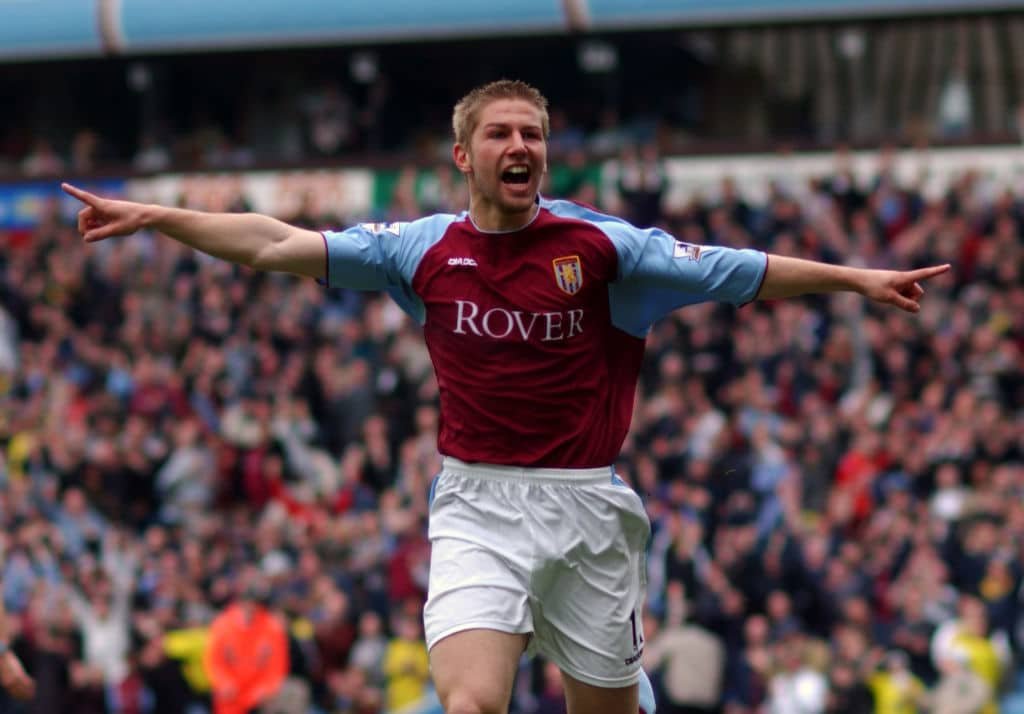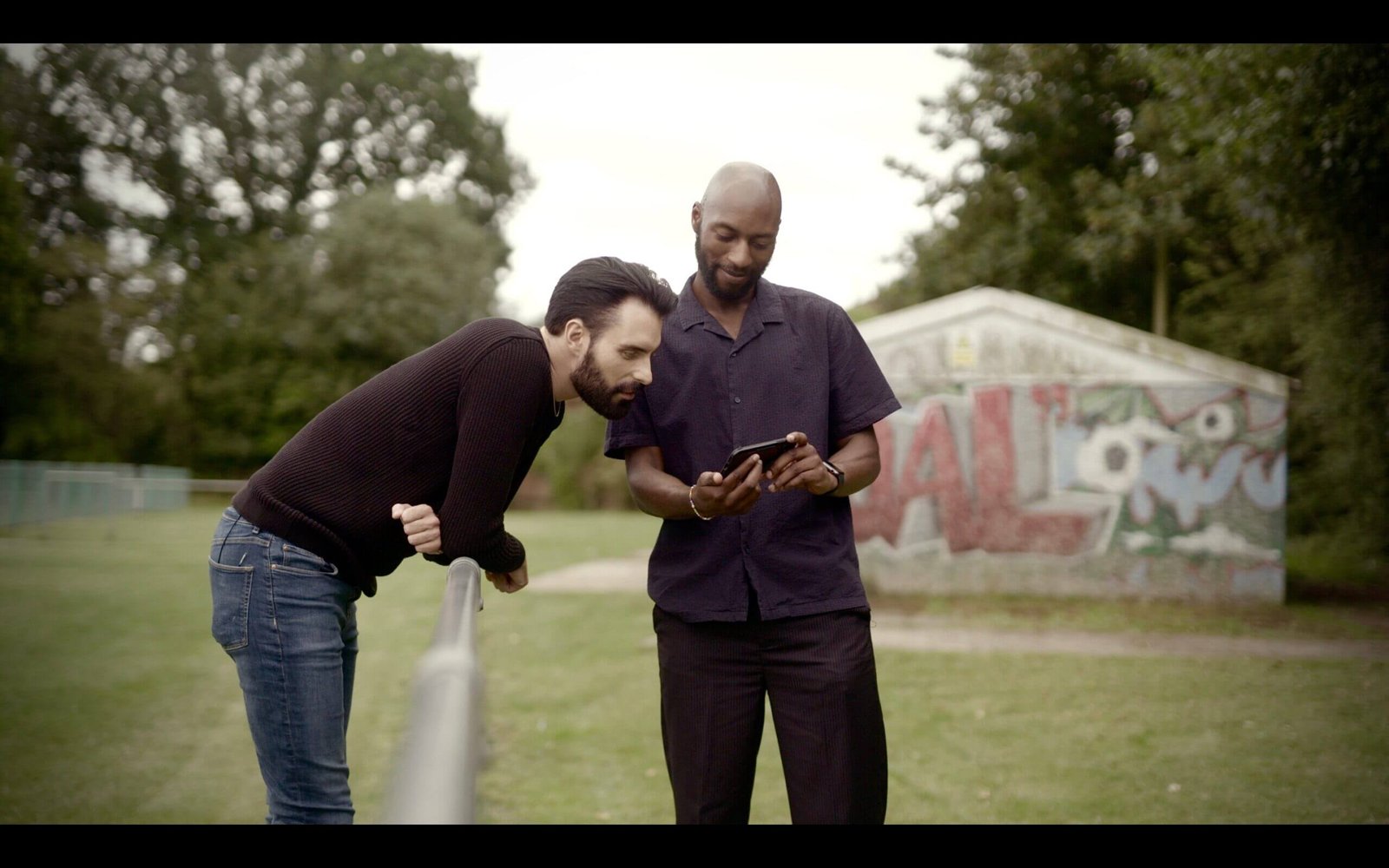“I was in the park with my friends and a group of boys approached us. I was on the swing — one of them threw me to the floor and kicked my head. I remember waking up in the back of an ambulance with a fractured skull. I was attacked for being gay and because I liked things other than football.”
Rylan Clark, the former X Factor contestant, Celebrity Big Brother winner and now one of the most recognisable broadcasters on British television and radio, is recounting how he was the victim of a homophobic attack in Stepney Green, east London. The incident occurred in Clark’s local neighbourhood when he was a teenager.
The Athletic meets Clark at the players’ lounge at the London Stadium. Clark is a West Ham United fan and regularly attends matches. He is here to talk about his documentary: Homophobia, Football and Me. The 35-year-old is, sadly, unsure whether football is a welcoming community for gay players and attributes that to his personal experiences.
“I was 15 when I came out to my loved ones,” he says. “I was on X Factor when I was 23 and the night of going on the plane to judges’ houses my phone blew up and they took it off me and said I need to focus. I was getting death threats and had 24-hour security. But I had to stay strong for the sake of me and my family. I had a choice where I could let the comments and death threats affect me, or I just think, ‘f*** you, I’ll carry on with my life because your words don’t mean s*** to me’.
“I’d already been through the experience of getting my skull fractured. Staying strong is what I’ve known, really. I’d be in the bar, some guys are talking about football, I’ll give my thoughts and they’ll say, ‘Oh, you watch football?’ Why is a gay person not supposed to watch and enjoy football? Believe it or not, I’m allowed to like guys and football. I still receive awful abuse daily just for being gay. I’d heard it all from, ‘You’re a faggot, you’re too skinny, you’re orange, you gay so-and-so’. It’s madness.”
Throughout the documentary, Clark interviews numerous figures within the sport, including ex-West Ham midfielder Thomas Hitzlsperger, who discusses coming out after his retirement in 2014. Rio Ferdinand, the former England and West Ham, Leeds and Manchester United defender, who opens up about his use of a homophobic slur live on BBC Radio 1 in 2006 and how his attitudes have changed — and Arsenal’s Jen Beattie, who explains the differing attitudes to homosexuality within the women’s game.
Clark with Beattie, who has just left Arsenal for Bay FC in the US (TNT)
“When the opportunity for the doc came along, my first thought was, ‘No, this isn’t for me. I don’t want to get involved in things I shouldn’t be getting involved in’,” Clark says. “Then I thought to myself, ‘f*** that, I’m a West Ham fan, this would be a good thing for me to do’. I was a bit reluctant because I didn’t want it to seem like I was lecturing.
“I’m 35 and I remember kids saying, ‘You’re so gay, you’re a battyman’ just to insult someone. When I went to Upton Park as a kid with my brother, we loved going to games and I did probably hear homophobic chants. Even then, I knew I was gay, I just didn’t know what gay meant. I found it interesting hearing Rio talk about language he’s used in the past, to then have his sister come out to him and how bad he felt after.
“If Rio were to say the word ‘faggot’ now, I’d be like, ‘You f****** idiot, what the f*** are you using that word for?’ I don’t blame him for using some of the language he did back then because that was the lad culture. I asked Rio if he regrets what he said and his response was, ‘Of course I do, but at the time it wasn’t to be insulting.’
“Then I spoke to Jen Beattie and in the women’s game it’s like being straight is the rarity. So can we really blame football? If you look at the women’s game, it’s normal, not an issue one bit. Why can’t it be like that in the men’s game? I’m pretty certain there are gay or bisexual footballers in the Premier League. You’d be stupid to think there isn’t one.”
In 1990, Justin Fashanu, Britain’s first £1million black footballer, became the first male footballer to publicly come out as gay. But the former Norwich City and Nottingham Forest forward took his own life in 1998, aged 37. In May 2022, Blackpool striker Jake Daniels became the UK’s first professional male footballer to come out publicly as gay since Fashanu.
Four months later, Zander Murray, the ex-Motherwell trainee, became the first senior player to come out in Scotland. Josh Cavallo, the Adelaide United full-back, came out publicly in October 2011. Jakub Jankto, the Cagliari midfielder and Czech Republic international, is the most recent male professional footballer to publicly come out.

Hitzlsperger, the former Villa, West Ham and Germany midfielder, made it public that he was gay once he had retired (Neal Simpson/EMPICS via Getty Images)
“I found it fascinating that someone like Thomas Hitzlsperger didn’t have the confidence to come out while he was playing,” says Clark. “I always thought it was a fan thing but Thomas wasn’t worried about the fans, he was worried about his team-mates. That really took me back. He generally believed his team-mates would have treated him differently and would have felt uncomfortable showering next to him. That shocked me.
“I understand, if a Premier League player came out tomorrow, it would be on the front newspapers. But what shouldn’t be a big deal is people’s reactions. The first footballer to do it will have to be brave unfortunately but I’d like to think it wouldn’t be as bad as people make it out to be. If a gay or bisexual player is thinking of coming out, I’d happily be there to offer advice. Football is a game I love and it should be for everyone to enjoy.
“I think most footballers are talked out of coming out by their agents. I don’t have full faith that the agent will offer them their full support. They will look at it as a business and will say, ‘You might become the golden boy for brands like Nike, Adidas and be known as the first openly gay Premier League footballer, but is it worth the intrusion into your private life?’. But my response would be, ‘So f****** what? The prime minister in France (Gabriel Attal) came out as gay. It wasn’t even a big deal, why can’t football have the same attitude?”

Clark speaking to Howlett-Mundle (TNT)
Clark also interviewed Jahmal Howlett-Mundle, the former Crystal Palace trainee, who came out as bisexual in July 2021 — and Thetford Town manager Matt Morton, who announced he was gay in 2020. The duo spoke about the support they received from their peers. Clark hopes one day the sport will be a safe environment for a high-profile professional player to come out.
“What does it have to do with you who I’m dating?” he says. “Or who a player is dating? What does it have to do with you who’s in that player’s bed at night? Then we wonder why a footballer in the Premier League hasn’t come out as gay. One thing that really annoys me is the silhouettes they use, like, ‘Which Premier League footballer could it be?’ But that’s the same silhouette they used last week for something like a heinous crime. So is being gay and committing a heinous crime the same thing?
“I hope this documentary will help educate people. If you’re a little bit worried about what you might think of yourself, then this doc probably isn’t for you. But all I’ll say is you’ll be pleasantly surprised because it’s not the documentary you’re expecting.”
Rylan: Homophobia, Football and Me, 13 Feb, 10.45pm on TNT Sports 1 and available to stream on discovery+.
(Top image: Ferdinand with Clark in the documentary. Photo: TNT)
Read the full article here


